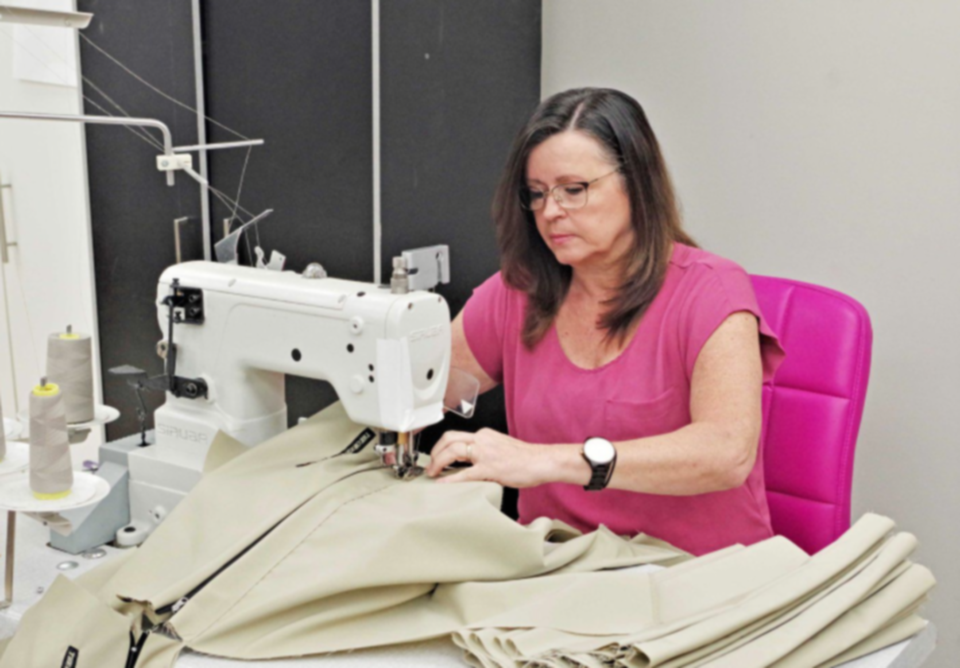It's been a phenomenal sales year for The Original Bug Shirt Company in Powassan.
As the business approaches its fiscal year-end in October, co-owner Julie Gohm says year-over-year sales have risen between 35 and 40 per cent, despite the presence of COVID-19.
When the pandemic first arrived last year, the lockdowns negatively affected bug shirt production, but Gohm and her employees dealt with that by turning out COVID masks.
The Original Bug Shirt Company has been around for about 30 years, with Gohm and her husband Dan buying the business from the original owners in October 2019.
She had been an employee of the company for most of those 30 years prior to assuming ownership.
Gohm says during her first year of operation, sales remained status quo. But as COVID-related lockdowns lifted throughout 2021, bug shirt sales went through the roof.
She believes a major reason why the business has had such astronomical sales is that “people were staying closer to home.”
With very little international travel taking place, Gohm believes more “people have been camping, fishing, and out more in their flower and vegetable gardens.”
She adds with increased awareness of ticks, people are taking more precautions to protect themselves against the eight-legged, blood-sucking bugs by wearing bug shirts and related apparel, such as the company's bug pants.
Gohm also doesn't expect sales to slow down.
The company website is being revamped to help increase international sales. To put the anticipated sales increase in perspective, Gohm says in fiscal 2022 she expects to sell between 17,000 and 20,000 bug shirts alone, along with any other additional apparel.
Gohm says when she and her husband took ownership, sales “were less than half that.”
For now, most bug shirt sales take place across North America, with the occasional sale overseas.
Once the website is fully revamped, a process Gohm says should be completed within a month, she expects to make huge gains in Europe and Australia because, as she puts it, “there are bugs everywhere.”
But the Original Bug Shirt Company's incredible growth has come at a cost.
Counting herself, Gohm says there are 11 people who churn out bug shirts at a hectic pace at the company shop in downtown Powassan.
“Because of the growth, we've worked crazy hours,” Gohm said.
“Starting with the beginning of April, I finally had a day off by the third week of August. I would easily work 11 to 12 hours a day. But I don't want that for myself or the employees. Rather, I decided let's bring in more people who can relieve the stress load.”
And that's where Gohm has run into problems.
Despite advertising with Service Canada for skilled, qualified sewers, not a single application from anywhere in the country has come to her.
Gohm put the help wanted sign back up again about three weeks ago and still, no one from Canada has applied.
“I've had about 25 to 30 people outside of North America who sent their resumes, with some of them pleading they want to come to Canada badly,” she said.
“I'm not opposed to bringing someone in from out of the country. But there are so many Canadians out of work that I'd like to make hiring Canadians my first choice.”
Gohm doesn't know exactly why she's having difficulties attracting workers. She believes geography may be a reason why and says the costs to relocate are high for someone who doesn't already live in Northern Ontario.
She needs two qualified full-time workers and plans to add more in the future. However, two is about the limit she can handle for now in order to bring any new person up to speed.
Gohm is looking for men or women who have worked with industrial sewing machine equipment and are familiar with units such as sergers, straight-stitch sewing machines, and top-stitch sewing machines.
“There are lots of people who are great home sewers, but that's like comparing apples to oranges to what we do here,” she said.
“Working in an industrial environment is completely different to a home sewing environment.”
Gohm says for the most part she has trained those who have worked at the shop and occasionally gets lucky when someone arrives with prior experience.
But with the company's explosive sales growth, training is something she can't afford to do much of anymore.
“If you're training someone from scratch it can take six to nine months to get close to the speed we need them to be at,” she said.
Gohm says those who have applied from other countries are highly qualified to do the work.
“These are people who can operate seven to eight different machines,” she said.
“Some have also been supervisors and managers, some are pattern makers. I wish they were in Canada because they're exactly what I'm looking for.”
The Original Bug Shirt Company operates year-round, so potential applicants don't need to worry about the work only being seasonal.
Gohm says the shop closes down for two weeks during the summer and another two weeks over Christmas.
But other than that, there are plenty of hours available, including overtime, if any new employee is looking for extra money.
She will hire international workers as a last resort if she can't find people in Canada because Gohm says, “I have every confidence we will grow as a company.”
A big reason for the future growth domestically and internationally is due to the business developing more apparel, including hoodies, sweatshirts, T-shirts and hats.
“So if you're wearing the bug shirt, we want you to do one-stop shopping and have the additional apparel,” she said.
“It's in anticipation of that further growth that I want to hire additional workers now.”
– Rocco Frangione is a Local Journalism Initiative reporter who works out of the North Bay Nugget. The Local Journalism Initiative is funded by the Government of Canada.




